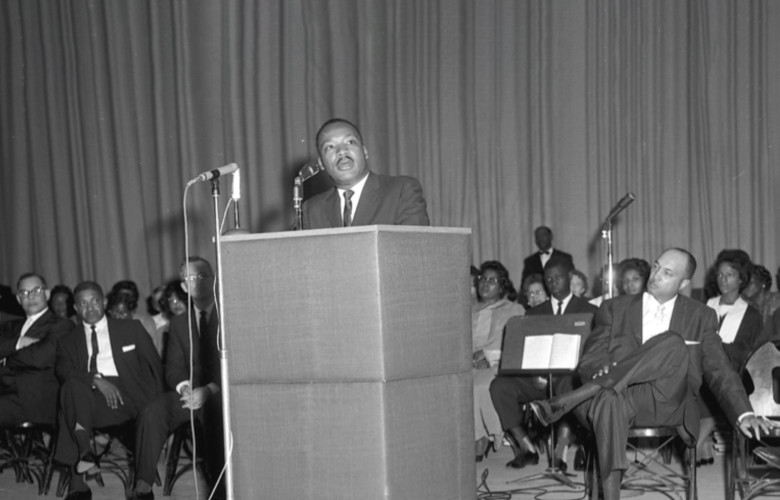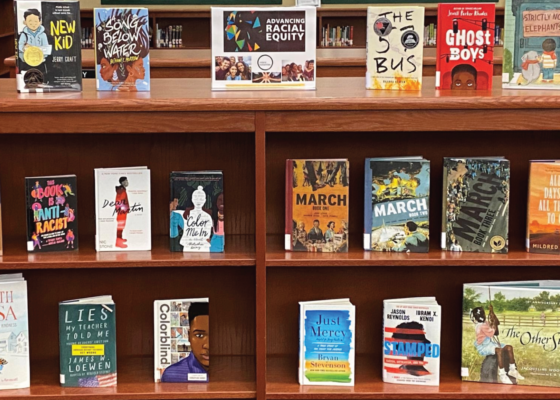“Before the Dream”: Dr. Martin Luther King Jr. in Fort Wayne
January 16, 2023“There come a time when a people get tired of injustice, oppression, exploitation. We want to be free.” – Martin Luther King Jr., June 5, 1963, Fort Wayne, Ind. On…
“There come a time when a people get tired of injustice, oppression, exploitation.
We want to be free.” – Martin Luther King Jr., June 5, 1963, Fort Wayne, Ind.
On June 5, 1963, at the height of the Civil Rights Movement, Dr. Martin Luther King Jr. spoke to a packed audience at the Scottish Rite Auditorium in downtown Fort Wayne, Indiana. Invited by his longtime friend Rev. Clyde Adams, Dr. King’s speech would address the city’s ongoing battle against racial inequality.
His remarks occurred three months before his famed “I Have a Dream” speech on Aug. 28 in Washington, D.C., and called for an end to racial segregation and for freedom for Black Americans.
Christopher Elliott’s debut book Before the Dream: Martin Luther King’s 1963 Speech, and Civil Rights Struggles in Fort Wayne, Indiana, explores the legacy of Dr. King’s words in the Midwestern city.
An excerpt from “Before the Dream” sets the stage for Dr. King’s speech in Allen County:
“Dr. King visited during one of the most transformative and turbulent years in the Civil Rights movement. His speech, which was by most accounts a routine stop on his busy calendar, was sandwiched between two of the most impactful events during a year when a revolutionary spirit permeated both Fort Wayne, and the nation. In April 1963, only six weeks prior to his trip here, unrest and conflict in the segregated south landed Dr. King in a Birmingham, Alabama, jail for one week. King and Rev. Ralph Abernathy were arrested for peacefully protesting racial segregation. Part of his jail term was spent languishing in solitary confinement. Fire hoses and police dogs were used by the Birmingham police department to discourage and punish adolescent demonstrators. Thousands of children were jailed. Slightly over two months after his brief stay in Fort Wayne, Dr. King helped lead the March on Washington. This seminal event was held in the capitol mall next to the Lincoln Memorial, and was highlighted by Kings unforgettable “I Have a Dream” speech in front of an estimated crowd of 250,000 citizens.
Dr. King’s 1963 Fort Wayne speech focused on the familiar refrain of social injustice toward African Americans throughout our country. He challenged the crowd to act swiftly to correct centuries of atrocities. Before a packed auditorium, in a mid-sized, Midwestern city, King urged its residents, of all races, to demand equality for all.”
“MLK has been a hero of mine since I was 15 years old. I had long been aware of Dr. King’s 1963 visit to my hometown so I decided to research his visit as part of a project I was working on,” said Elliott.
Today, when we learn about the Civil Rights Movement, we are often pointed towards what are considered major moments in history. Many of those well-known events took place in the South — Rosa Parks refusing to give her bus seat to a White man in Montgomery, Ala., or when nine Black students, known as the Little Rock Nine, arrived for class at Central High School after school segregation was made illegal, only to be met by the Arkansas National Guard and an angry mob. But, as explained in Elliott’s book, the Civil Rights Movement also made an impact in places like Fort Wayne.
“Some say slow up. You’re moving too fast. We can’t — we love America too much.
We’re through with gradualism, tokenism, see-how-far-you’ve come-ism.”
— Martin Luther King Jr.
“The legacy of Dr. King’s memorable visit continues to this day,” said Elliot. “A bridge erected in his honor stands as a gateway to downtown Fort Wayne and illuminates the night. Walking paths on the bridge contain plaques with several of his most memorable quotes. Also, a permanent memorial honoring his speech was erected and unveiled [in 2022].”
To continue learning about the Dr. King’s lifetime of work, read this blog post published by the Indianapolis Public Library, which shares links to some of his speeches and additional reading resources.
About Christopher Elliott
Elliott is a lifelong resident of Fort Wayne, Ind., where he works as a high school history teacher. He developed an interest in history as an adolescent, including a passion for the Civil Rights movement. Chris and his wife and teenage son still reside in the Summit City. Chris is also the proud stepfather to three adult stepchildren and grandfather to one grandchild. In his free time, he enjoys reading traveling, and sports. In 2022, “Before the Dream” was shortlisted for the Indiana Authors Awards Debut category.
Sources:
Elliott, Christopher Warren. Before the Dream: Martin Luther King’s 1963 Speech, and Civil Rights Struggles in Fort Wayne, Indiana. Arcadia Publishing, 2021.
Kilbane, Kevin. “Teacher’s Book Explores 1963 MLK Visit to Fort Wayne.” Today’s Catholic, 13 July 2021, https://todayscatholic.org/teachers-book-explores-1963-mlk-visit-to-fort-wayne/.
Seigel, Peggy. “Martin Luther King’s Visit to Fort Wayne.” Martin Luther King’s Visit to Fort Wayne, http://historycenterfw.blogspot.com/2011/01/martin-luther-kings-visit-to-fort-wayne.html.



